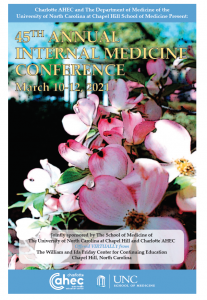UPDATE: This year, as a result of lower programming costs associated with the virtual format, organizers invite UNC faculty and UNC PN clinicians to attend at a reduced rate of $200 for the entire conference, or half of the daily or two-day rate. (Note, reduced rates may not be possible next year with a return to in-person attendance, due to the much higher costs of providing an in-person venue with meals/snacks.) To receive the 50% discount, please use this code: UNCFAC2021.
 A Premier Annual CME Event Continues
A Premier Annual CME Event Continues
Last year, by mid-March, 2020, COVID-19 had upended traditional education experiences and this included the annual internal medicine conference, presented by Charlotte AHEC and the UNC Department of Medicine. While most events across the state and nation were immediately cancelled, UNC faculty physicians in the Department quickly converted this annual March program to an online format. In the end, attendees were pleasantly surprised to find the conversion to a webinar was just as good of an option, if not better.
This year’s virtual event promises to be one of the best internal medicine conferences to-date, presented by UNC’s top-ranked specialists. Designed for internists, family physicians, generalists, advanced practice providers and other health care providers working in an adult primary care setting, the conference will provide cutting edge, evidence-based updates on common medical conditions managed by primary care clinicians, including SARS-CoV-2 updates.
Inviting More Participants
As a virtual event, the 45th Annual Internal Medicine Conference will have the capacity to invite a greater number of participants to the program, presented live from the William and Ida Friday Center for Continuing Education. With representation from every subspecialty in the UNC Department of Medicine, following are a few of this year’s highlights.
Highlights
Mini-symposium on SARS-CoV-2:
Learn from leading UNC infectious disease specialists who led the development of a COVID-19 test for UNC Medical Center, led phase III vaccine trials for Moderna, and now Novavax, and specialists who are managing the roll-out of long-awaited antiviral treatment.
- “Epidemiology of SARS-CoV-2 Infection in the US” — Arlene C. Seña, MD, MPH
- “Diagnostic Testing for SARS-CoV-2 and Other Respiratory Pathogens” — Melissa B. Miller, PhD
- “Prevention of SARS-CoV-2, Vaccines and Other Preventive Strategies” — Cindy Gay, MD, MPH
- “Outpatient Management Including Antiviral Treatment of SARS-CoV-2” — David A. Wohl, MD
Cannabidiol and Cannabinoids:
Significant interest continues for the development of therapies and other consumer products derived from cannabis and its components, including cannabidiol (CBD). Get answers to the most commonly asked questions from a leading specialist.
- “CBD-What a Clinician Needs to Know” — Brent Bauer, MD, Mayo Clinic Professor of Medicine and Research Director of Integrative Medicine.
Mini-symposium on Hospital Medicine:
Get updates from hospitalists, recently called into new roles on the COVID-19 front lines, as they continue to focus on improving care for hospitalized patients with complicated needs.
- “Don’t Get Clot Off Guard: DVT Prophylaxis in Hospitalized Patients” — Ann Marie Kumfer, MD and Trudy Li, MD
- “Alcohol Withdrawal Therapy in the Hospitalized Patient” — Emily Sturkie, MD
- “Inpatient Therapy for SARS-CoV-2” — Jessica L. Guidici, MD
Health Disparities, Racism in Medicine, and the Impact of Social Isolation:
Learn from specialists how the attitudes and behaviors of medical providers can be one of the many factors that contribute to health disparities. Gain insight on the barriers to care and how to address the social determinants of health, including one novel solution that could make food a form of medicine.
- Colindres Lecture: “Breath, Eyes, Memory: Racism and the Fierce Urgency of Transforming Systems for Racial Healing” – Wizdom Powell, PhD, MPH.
- “Race-Based Nephrology: What We Need to Learn” — Keisha Gibson, MD, MPH
- “Screening for Health-Related Social Needs: What Clinicians Need to Know” — Seth Berkowitz, MD, MPH
- “Social Isolation and Health: What Primary Care Clinicians Need to Know and Do” — Crystal Wiley Cené, MD, MPH
Mini-symposium on Common Cancers and Survivorship:
Get the latest updates on helping patients manage breast cancer and prostate cancer.
- “Update on Principles of Management for Newly Diagnosed Breast Cancer” — Trevor Jolly, MBBS
- “Prostate Cancer: New Diagnostic Approaches, Risk Stratification, and Initial Management” — Marc A. Bjurlin, DO, MSc
- “The PCP Role in Caring for Cancer Survivors” — Deborah Mayer, PhD, RN
Mini-symposium on Opioids:
Learn the newest approaches for pain management. This symposium can fulfill part of the requirements for physician licensure.
- “Non-pharmaceutical Approaches to Chronic Pain Management” — Karla Thompson, PhD, & Jessica Barnhill, MD
- “Pharmacotherapy Update for Pain Management” — Timothy Ives, PharmD, MPH, CPP
- “The Other Epidemic: Updates in the Treatment of Opioid Use Disorder” — H. Claire West, MD
Other highlights:
- “Atypical Diabetes, Recognizing Opportunity” — John Buse, MD, PhD
- “Thrombosis and Anticoagulation: Clinically Relevant Developments in the last 12 Months” — Stephan Moll, MD
- “New Methods to Screen Women for Cervical Cancer, STIs, & Bacterial Vaginosis” — with Karen Kimel-Scott, MD & Katelin Zahn, MD.